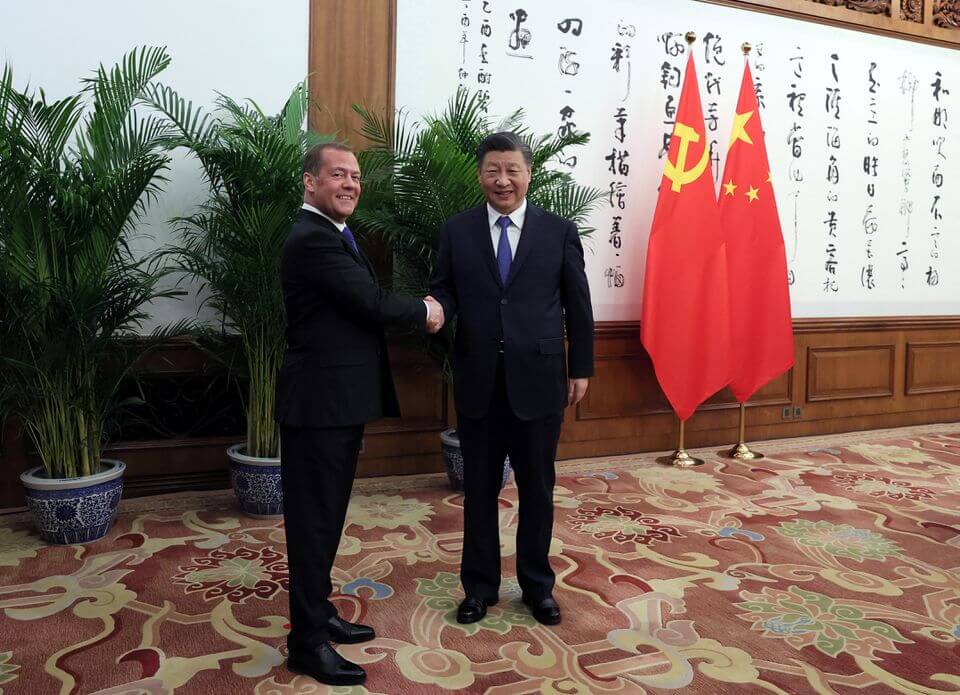During a meeting with former Russian President Dmitry Medvedev in Beijing on Wednesday, Chinese President Xi Jinping stressed that China “actively promotes peace talks” between Russia and Ukraine.
“China decides its position and policy based on the merits of the matter concerned, upholds objectivity and fairness,” Xi affirmed, expressing hope that the two sides “will remain rational and exercise restraint, carry out comprehensive dialogue, and address joint security concerns through political means.”
Was providing interviews without electricity almost all the day. Zelenskyy makes a historic visit to meet Biden to talk about peace in 2023. Meanwhile Xi is meeting Medvedev and says he wants russia to negotiate with Ukraine. #ukraine #peace pic.twitter.com/SrLfQV9fSQ
— Iuliia Mendel (@IuliiaMendel) December 21, 2022
Medvedev, who is also the Deputy Chairman of the Russian Security Council and the chairman of the United Russia Party, told Xi that Moscow had its reasons for launching the war, which are “very complicated.”
He noted, however, that “Russia is willing to solve the problems through peace talks.”
China has maintained strong relations with Russia during the past year and refrained from publicly denouncing Russia’s military actions in Ukraine. Just last month, in a letter to the 4th China-Russia Energy Business Forum on Tuesday, Xi stated that “China is ready to work with Russia to forge closer partnership in energy cooperation.”
China has also firmly opposed unilateral sanctions against Russia and has refused to partake in any price caps and voted against or abstained from United Nations resolutions against the country. In fact, just before the Ukraine war began, China and Russia signed a “no limits” partnership.
Xi Jinping called for a dialogue on Ukraine during his meeting with Dmitriy Medvedev.
— Anton Gerashchenko (@Gerashchenko_en) December 21, 2022
Xi Jinping told Medvedev he hopes China and Russia can deepen their strategic cooperation.
Why didn't Putin come to the meeting? pic.twitter.com/uNVuH1w5As
Ukraine has urged China to play “a more noticeable role in bringing this war to an end,” believing that Beijing will play a key role in establishing a “new global security system” and also be a crucial guarantor within that system.
In recent months, China has begun to express some doubt about Russia’s actions. During the Shanghai Cooperation Organization (SCO) summit in September, Putin praised China’s “balanced position” on the Ukraine war and said he “understands” its “questions and your concerns in this regard,” indicating that China may have reservations about the Ukraine war.
A month later, China described the situation in Ukraine as “worrisome,” after Russia launched missile attacks on several civilian areas across Ukraine in retaliation to the Crimean Bridge blast.
It then signed the joint declaration at the G20 summit in Bali last month, which said “most members strongly condemned the war in Ukraine.”
Meanwhile, former Russia president Medvedev met with China's President Xi Jinping in a visit to Beijing. Medvedev, one of the most hawkish voices in Moscow, said he and Xi discussed Russia and China's "strategic partnership" and the conflict in Ukraine. pic.twitter.com/jLuHCislLj
— Guy Elster (@guyelster) December 21, 2022
China is wary of damaging ties with the European Union (EU). In fact, he told German Chancellor Olaf Scholz last month that he is against using nuclear weapons and does not want the Ukraine war to escalate. He also called for diplomatic efforts to resolve the crisis earlier this month when European Council President Charles Michel visited Beijing.
In spite of these developments, Xi told Medvedev that China is “ready to work” with Russia to advance bilateral ties in the new era and “make global governance more just and equitable.” He also noted that relations between the two countries have “withstood the test of international changes and maintained sound, steady and high-level development” over the past decade.
Therefore, “developing a China-Russia comprehensive strategic partnership of coordination for a new era is a long-term strategic choice,” he remarked.
Xi stressed that the two nations “could learn from each other in building ruling parties,” contributing “wisdom and strength to deepen” their strategic partnership.
The former president stated that they discussed the interaction between Moscow and Beijing, as well as economic and industrial cooperation issues, during their meeting with Chinese President Xi Jinping.
— Gurbaksh Singh Chahal (@gchahal) December 21, 2022
Medvedev, meanwhile, mentioned that the United Russia party is willing to “actively promote bilateral cooperation in the economy, trade, energy and agriculture sectors, jointly resist various external pressures and unfair measures.” Furthermore, he outlined his desire for “greater development” of the comprehensive strategic partnership between Moscow and Beijing.
He also gave Xi a letter from Russian President Vladimir Putin, which noted the “unprecedented level of Russian-Chinese political dialogue and practical cooperation and expressed confidence in unfailing gradual development of interstate and interparty ties.”
Worth noting: Medvedev goes to Beijing to meet with Xi "at the invitation of the CCP" on the day the Russia-China Joint Sea 22 joint military exercises in the East China Sea begin, the closest they have been held to the Taiwan Strait since the annual war games began a decade ago https://t.co/5WEEw9mgVk
— Giulia Pompili (@giuliapompili) December 21, 2022
On the day of their meeting, Chinese Foreign Ministry spokesperson Mao Ning slammed the United States for making “groundless” accusations about China and Russia deepening ties in order to undermine North Atlantic Treaty Organization (NATO).
“China is committed to safeguarding world peace, stability and prosperity. Relevant parties need to stop making groundless accusations and smearing China, stop whipping up confrontation and creating imaginary enemies, stop making NATO a tool to perpetuate hegemony and destabilize the world, discard the Cold War mentality and bloc confrontation, and do more that are conducive to world peace and stability,” she asserted.

